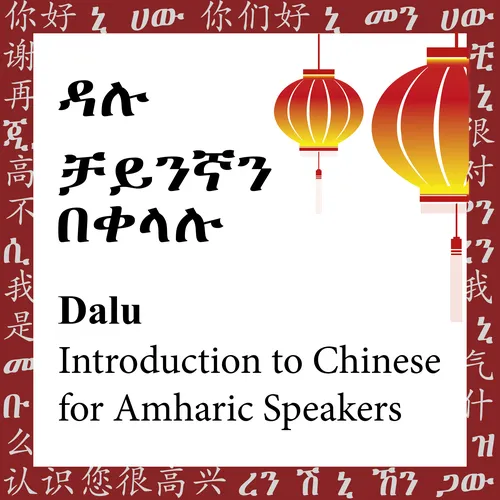
Introduction To Chinese for Amharic Speakers
This is the first course in the world that teaches Amharic speakers introductory Mandarin. Amharic is the official language of Ethiopia, a country with a population of 100 million. This course in Amharic shatters the language barrier and offers cultural contexts unique to these two cultures.
This podcast consists of 50 episodes, split across 25 unique chapters. Each chapter starts with a detailed description of vocabulary and usage in Amharic followed by dialogues between two native Mandarin speakers. You will know exactly how everything is pronounced. It is the best of both worlds!
The book accompanying this podcast can be found on Amazon under "DALU: Introduction to Chinese for Amharic Speakers" by Lina Getachew Ayenew
- Update frequency
- every 6 days
- Average duration
- 7 minutes
- Episodes
- 50
- Years Active
- 2015
![Chapter 3b – Talking to a Guest [Dialogue]](https://b2.eachpod.com/podcast-imgs/99c7817c03a61db7bddf4ba120635407.webp)
Chapter 3b – Talking to a Guest [Dialogue]
These are dialogues that help you practice the various phrases that we have learnt in Chapter 3. As usual, each dialogue is repeated three times to make it easier to remember.

Chapter 3a – Talking to a Guest
This chapter tells you what you have to say when you receive a guest in your office. You will also learn how to say “I’m sorry,” and how to accept an apology.
![Chapter 2b – Introducing Yourself [Dialogue]](https://b2.eachpod.com/podcast-imgs/99c7817c03a61db7bddf4ba120635407.webp)
Chapter 2b – Introducing Yourself [Dialogue]
These are dialogues that help you practice the various phrases that we have learnt in Chapter 2. As usual, each dialogue is repeated three times to make it easier to remember.

Chapter 2a – Introducing Yourself
This chapter explains how you can introduce yourself and what is appropriate to say when you meet someone new. We also learn about titles such as “Mr.” and “Mrs.” as well as how to ask for someone’s …
![Chapter 1b – Greetings [Dialogue]](https://b2.eachpod.com/podcast-imgs/99c7817c03a61db7bddf4ba120635407.webp)
Chapter 1b – Greetings [Dialogue]
Here we will practice how to greet and how to say “thank you.” The sentences in this dialogue are repeated three times to make them easier to commit to memory.

Chapter 1a – Greetings
This chapter teaches basic greetings in Chinese. We also learn how to say “thank you” and “you’re welcome.” Did you know that the direct translation of the phrase “you’re welcome” in Chinese is “don’…

Introduction – iv – Pinyin
Pinyin is a way of capturing the sounds of Chinese characters using the roman alphabet. This episode provides a basic description of this system. Because this course is intended for Amharic speakers,…

Introduction – iii – Tones
Mandarin Chinese has four distinct tones. In this chapter, we try to distinguish what each of these tones sound like. Tones are very important because the same pronunciation will have different meani…

Introduction – ii – Beauty and System of Chinese Characters
In this episode we will take a look at how logical the Chinese writing system is. Chinese writing is very systematic and there are sometimes patterns we can follow to find the meanings they convey.

Introduction – i – Short History of Mandarin Chinese
Before getting into the language, we look at an extremely brief history of the Chinese language. We briefly discuss the difference between Mandarin and Cantonese, as well as mention the variance in s…